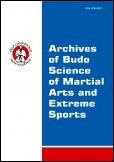2018, Volume 14, Issue 1
Coping styles and achievement motivation in elite wrestlers
Katarzyna Rutkowska1, Dariusz Gierczuk2
1Department of Psychology, Faculty of Physical Education and Sport in Biala Podlaska, Jozef Pilsudski University of Physical Education in Warsaw, Warsaw, Poland
2Department of Theory and Technology of Sport Training, Faculty of Physical Education and Sport in Biala Podlaska, Jozef Pilsudski University of Physical Education in Warsaw, Warsaw, Poland
Author for correspondence: Dariusz Gierczuk; Department of Theory and Technology of Sport Training, Faculty of Physical Education and Sport in Biala Podlaska, Jozef Pilsudski University of Physical Education in Warsaw, Warsaw, Poland; email: darekgierczuk@op.pl
Full text
Abstract
Background &Study Aim: Coping styles and achievement motivation are factors that, according to some authors, determine athletes’ psychosocial sports and life-related effectiveness. The findings of the present study constitute an element of more extensive research plan. The study sought to knowledge about coping styles and dimensions of achievement motivation in elite wrestlers.
Material & Methods: Forty-seven male Greco-Roman wrestlers (members of the Polish Junior and Senior National Team) participated in the study. Two psychological tools were employed in the study: Coping Inventory for Stressful Situations (CISS) and Achievement Motivation Inventory (LMI).
Results: Wrestlers demonstrated average levels of three examined coping styles and achievement motivation. At the same time, numerous correlations were observed, particularly between task-oriented coping dimension and different dimensions of achievement motivation. Furthermore, it was proved that the age of the participants correlated with coping styles and particular dimensions of achievement motivation. In turn, the length of competitive experience correlated with some dimensions of achievement motivation only.
Conclusions: Further research is needed to explore the issues presented in the study. However, already at this stage their description may provide input to the discussion on psychological training in wrestling. The authors of the study recommend cooperating with sports psychologists and developing sport-specific psychological resources in order to enhance sports effectiveness but also to be able to function optimally outside sport and for the sake of holistically understood health.
Key words: achievement motivation, competitive experience, coping with stress, sport psychology





